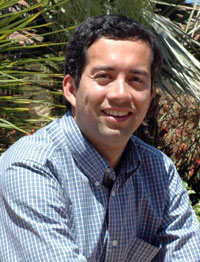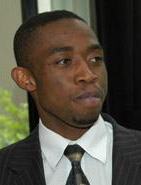
Professor Eric Johnsen’s research program resides in developing novel, robust, efficient techniques for high-fidelity numerical simulations of high-speed flows of variable-composition fluids. He and his group used these techniques to uncover the basic principles underlying these complex multiscale and multiphysics flows. In nature and engineering, many flows take place at sufficiently high speeds that inertia dominates viscous forces. Thus, the flow physics are governed by highly nonlinear convective effects, as evidenced by the complex dynamics and wide range of spatio-temporal scales of turbulence. Additionally, when fluids of different compositions are present, the fluid dynamics become coupled to thermodynamics, heat/mass transport and sometimes deformations of solids bounding the flow. Consequently, a full understanding of the processes governing energy transfer and dissipation, as well as mixing, remains lacking in these flows.
To make progress, Eric’s group focuses on elucidating fundamental, canonical problems in compressible, multiphase and turbulent flows with specially designed numerical methods. The cavitation and mixing problems that the group has been exploring lie at the crux of a wide range of applications in biomedical engineering (diagnostic/therapeutic ultrasound, cavitation in medicine, cardiovascular flow), transportation engineering (shocks, turbulence and mixing in combustion and jet engines, cavitation erosion in naval engineering, vehicle aerodynamics) and energy sciences (hydrodynamic instabilities and mixing in inertial confinement fusion and astrophysics). Supported by NSF, NIH, ONR, DOE/NNSA and Ford, Prof. Johnsen’s research in these areas has earned him recognition in the field, including two best student paper awards and several young investigator awards.
Prof. Johnsen’s research has been featured on the cover of the Journal of Applied Physics on two occasions in 2015; several other of his group articles are among the most cited since their publication in their respective journals, with one paper that was published in 2010 already receiving over 140 citations. Several of his students have been recognized with individual awards, including three NSF GRFPs and one DOE SCGSR award, as well as four RMFs and numerous other institutional awards.

Early in his career, Professor Chinedum Okwudire has become a nationally recognized leader in smart and sustainable manufacturing who leverages the fundamental engineering disciplines of machine design, mechatronics, structural dynamics, and control theory to tackle some of the most difficult challenges in precision, throughput and energy-efficiency faced by the manufacturing and automation industries. In the short period that he has been at The University of Michigan, he has published over 15 papers in leading archival journals in design, manufacturing, precision engineering, and controls. Dr. Okwudire has several projects funded by NSF, including the CAREER award in 2014, with additional projects by industry sponsors such as Ford.
Examples of his work include low cost and energy efficient vibration reduction in a wide range of machines, speed and energy efficiency improvement in feed drives, and high throughput and affordable nanopositioning. His scholarly and teaching contributions have been recognized by several awards that include the International Symposium on Flexible Automation Young Investigator Award; the Society of Manufacturing Engineers Outstanding Young Manufacturing Engineer Award; the SAE International Ralph Teetor Educational Award; and a number of best paper awards.
Prof. Okwudire’s students provide glowing feedback, particularly noting how he inspires them to become better engineers and the effort that he makes at getting to know them personally, even for required courses with large class sizes. He has led several curriculum improvement initiatives in the department including a much-needed complete revitalization of the graduate level manufacturing course ME584. Moreover, he has led an ambitious “course concept mapping” of the entire ME curriculum, which he was invited to present at the NAE Frontiers of Engineering Education Symposium. His outreach efforts have included programs to engage Detroit area youth as well as sustainable manufacturing in developing regions of the world including Africa and South America.

